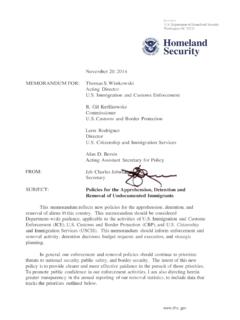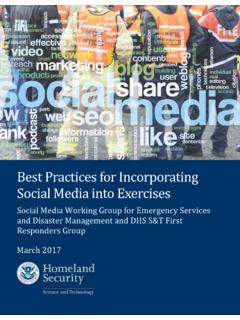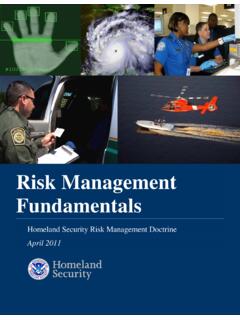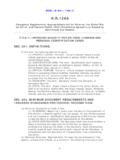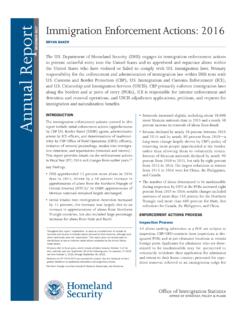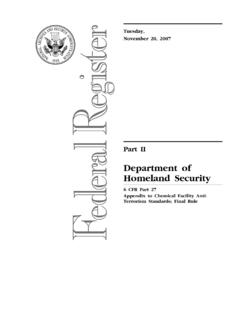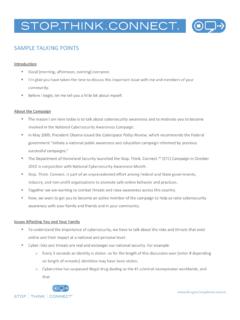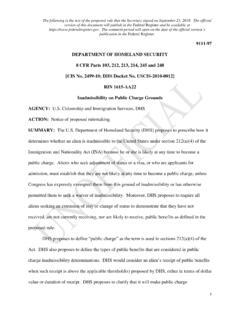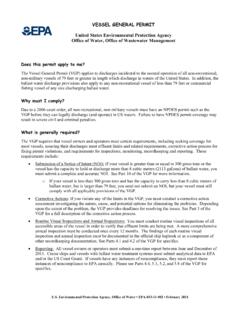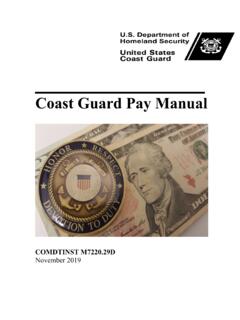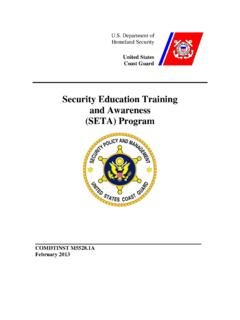Transcription of Coast Guard Business Intelligence (CGBI) System
1 Privacy Impact Assessment for the Coast Guard Business Intelligence (CGBI) System DHS/USCG/PIA-018 April 17, 2012 Contact Point Mr. David Bandel CGBI Program Manager United states Coast Guard , CG-0954 (202) 372-4570 Reviewing Official Mary Ellen Callahan Chief Privacy Officer Department of Homeland Security (703) 235-0780 Privacy Impact Assessment United states Coast Guard Coast Guard Business Intelligence (CGBI) System Page 1 Abstract The United states Coast Guard (USCG) owns and operates the Coast Guard Business Intelligence (CGBI) System . CGBI is a Business Intelligence (BI) and mission support tool which provides USCG users with a web-based reporting and analysis capability. CGBI utilizes standardized enterprise data and metrics, consisting of the Enterprise Data Warehouse (EDW), and a front-end BI application providing standardized reports and data cubes.
2 This System was created to provide an integrated reporting and analysis environment for organizational Knowledge and Performance Management by providing one version of the truth. This Privacy Impact Assessment (PIA) is required as the System contains personally identifiable information (PII) obtained from authoritative, transactional source systems; this data may be transferred or viewed by other personnel or systems upon data sponsor approval, with limited PII data available within the CGBI interface to authorized users. Overview By law, the Coast Guard has 11 missions: ports, waterways and coastal security; drug interdiction; aids to navigation; search and rescue; living marine resources; marine safety; defense readiness; migrant interdiction; marine environmental protection; ice operations; and law enforcement.
3 The purpose of the CGBI System is to provide data analysis and reporting capability across all 11 USCG mission areas, including Mission Support and Business Support functions, using standardized data and performance metrics. CGBI's goal is to constantly improve USCG outcomes by providing BI and analysis of USCG activities, performance, capabilities and readiness. Currently, CGBI accesses information from approximately 50 transactional Information Technology (IT) systems within the Department of Homeland Security (DHS), the federal government, and industry to provide USCG a unified data view used for Business support and knowledge management. CGBI is a USCG System sponsored by the Office of the Vice Commandant (CG-0954).
4 This project is authorized under the Clinger-Cohen Act of 1996 (40 1401(3)), the Government Performance and Results Act of 1993, Executive Order 13011: Federal Information Technology; Circular No. A-130: Management of Federal Information Resources, and Title 14 93 Commandant; general powers. CGBI is designed to provide operational and performance analysis for reporting across all 11 mission areas of the USCG, as well as Mission Support and Business Support functions. Most reports do not depend upon PII. CGBI supports the DHS Intelligence and Warning, Emergency Preparedness and Response, Border and Transportation Security, and Protecting Critical Infrastructure and Key Assets mission areas. CGBI does not share any PII from the general public with any System or agency.
5 A typical user transaction within the CGBI System could be characterized using the Merchant Mariner Licensing and Documentation (MMLD) Credential Current cube as an example. Cubes are large, detailed dimensional data constructs similar to the more common pivot table found in spreadsheet software such as Microsoft Excel. The MMLD Credential Current cube contains dimensions such as application dates, transaction types, current states and others. Standardized measures such as Average (Avg.) Days Total for Credential, Avg. Days to Current State, Avg. Hours Total for Credential, Avg. Hours to Privacy Impact Assessment United states Coast Guard Coast Guard Business Intelligence (CGBI) System Page 2 Current State, Credential Count, Personnel Casualties, Total Days for Credential, Total Days to Current State, Total Hours for Credential, Total Hours to Current states are then applied to the selected data set.
6 This particular cube utilizes data from MMLD to display the status of each Mariner application and credential, their times to reach the current state and total life-cycle time, providing the user a completely customized end data product tailored to the user s specific needs at the time. CGBI is a read-only System located on the USCG Data Network (One Net). CGBI provides users with a web-based reporting toolset that utilizes standardized USCG-wide enterprise data. This toolset includes the following Business lines: views, reports, cubes, and repository analytics. CGBI provides a centralized repository of USCG enterprise information customized for reporting. CGBI receives data required for reporting from authoritative source systems; this data may include PII.
7 Based on requirements, CGBI will use this data to build a product within one of its Business lines. CGBI provides System and ad-hoc user access to approved data sets in the EDW. EDW function is to hold a working copy of data from different systems and rearrange the data for speed of access by subject, no matter what System it came from, regardless of what architecture the transactional data System used. The internal architectures are completely different. The EDW is the normalized source of data for the reporting using the BI tools, but it remains a copy, not the authoritative source. In order to protect privacy, CGBI is limited to all authorized Active Directory (AD) users located on the One Net.
8 Upon program office/customer request, product access can be limited as follows: Applications - Measures Repository and Personnel Allowance Amendment (PAA) based on Employee ID (EMPLID) and/or Active Directory (AD) User ID. Cubes/Reports - Department ID (DEPTID) or EMPLID. Database - Data field or table-level based on authorized user name. CGBI products containing PII information are marked with a red FOUO - Privacy Act Sensitive banner. Back-end users of the EDW must complete a CGBI Access Authorization Form and abide by the CGBI Policies and Procedures document. The Access Authorization Form lists which data elements the user has requested access to and signature approvals from the requestor s supervisor, government supervisor (if contractor), CGBI Authorizing Official and the Source System Owner, Information System Security Officer (ISSO), or Data Steward.
9 Access for that user is then limited to only the approved data elements. The overall privacy risk associated with CGBI is improper handling or use of PII. Some systems transfer PII from the general public such as name, address and phone number to CGBI, but access to this information is limited to users with a need to know and for official use only. To mitigate improper handling of PII, appropriate access agreements (for example, nondisclosure agreements, acceptable use agreements, rules of behavior, and conflict-of-interest agreements) are completed for individuals requiring access to organizational information and information systems before authorizing access. Privacy Impact Assessment United states Coast Guard Coast Guard Business Intelligence (CGBI) System Page 3 This PIA shall be updated as necessary, when revisions to CGBI occur.
10 Section Authorities and Other Requirements What specific legal authorities and/or agreements permit and define the collection of information by the project in question? CGBI is authorized under the following legal authorities: Title 40 1401(3), the Clinger-Cohen Act of 1996. A statute which directs the development and maintenance of IT architectures by federal agencies, to maximize the benefits of IT within the government. Government Performance and Results Act of 1993. A statute wherein its purpose is to: improve the confidence of the American people in the capability of the federal government, by systematically holding federal agencies accountable for achieving program results; initiate program performance reform with a series of pilot projects in setting program goals, measuring program performance against those goals, and reporting publicly on their progress; improve federal program effectiveness and public accountability by promoting a new focus on results, service quality, and customer satisfaction; help federal managers improve service delivery, by requiring that they plan for meeting program objectives and by providing them with information about program results and service quality.
